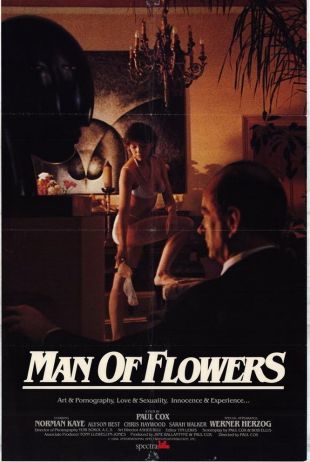Australian arthouse director Paul Cox followed up his 1982 success Lonely Hearts with this popular seriocomedy that reteamed him with frequent collaborator Norman Kaye. It's a way-offbeat character study about a wealthy, fiftysomething eccentric, Charles Bremer (Kaye), who regularly pays an artist's model (Alyson Best) to strip to an aria from Donizetti's +Lucia di Lammermoor while he watches. His motivations are pure: a sexually repressed figure with oedipal fixations, he merely wishes to take in the glory of the nude female form, so he never touches or violates her. Eventually, he devises a way to permanently separate her from her drug-addicted artist boyfriend, whose own contemporary painting Bremer - and Cox - regard as an eyesore. Cox's picture may be most interesting from a stylistic standpoint: it utilizes an experimental technique by bridging the threshhold between Bremer's waking life and his dream life. The director conveys the latter through grainy 8mm home movies from Bremer's childhood, that include appearances by Werner Herzog as the subject's strange, frightening, emotionally aloof father. These cutaways were an ingenious choice: like the finest cinema direct documentaries, they force the viewer into an analytical mindset, with a flurry of visual clues that offer endless possibilities for intensive behavioral interpretation; they also cast a truly haunting spell over the audience. On a tonal level, however, Cox counterbalances these dark undercurrents with an almost prankish sense of humor, manifest in the nutty deadpan dialogue of the supporting characters. Like all of Cox's films, this outing continues to polarize viewers, but those with a fondness for offbeat cinema and a love of classical music will find it splendid. Best of all is Kaye, who - as usual - delivers a superb, lived-in performance. The film's only real faults lie in its blackly comic resolution - which strains credibility -- and in its sardonic and cynical attitude toward spiritual faith (manifest in a needless comic sequence with a perverted radio evangelist). Aside from these missteps, Man of Flowers is a success.

Man of Flowers (1983)
Directed by Paul Cox
Genres - Drama, Romance |
Sub-Genres - Psychological Drama |
Release Date - Dec 16, 1984 (USA - Unknown) |
Run Time - 91 min. |
Countries - Australia |
MPAA Rating - NR
Share on